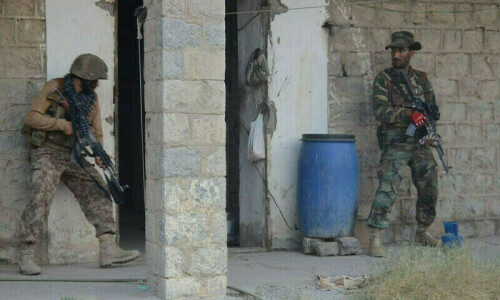KARACHI: “We are students. Our weapons are pens and books,” says Latif Johar. He is sitting at a protest camp outside the Karachi Press Club, on a hunger strike till death, unless his missing party leader Zahid Baloch is returned.
“We do not believe in violence. We believe in fighting for our rights through democratic political means,” he says.
Though exuding an outwardly calm, Latif Johar, a member of BSO’s central committee, is aptly voicing the turmoil of all Baloch who live in Pakistan, especially those in their home province.
He is accompanied by both young men and women, and elderly women too. Some of them are with their families, some of them are single. But all of them have one agenda: to put pressure on the State and intelligence agencies so that they help free Zahid Baloch and Zakir Majeed, another leader who is also missing.
“We have lost leader after leader, worker after worker,” says Latif.
“First they picked up Zakir Majeed about whom we have no news. They picked up Kumbar Chakar, Comrade Qayuum, Shafiq Baloch, and Raza Jahangir most of them members of the central committee. Over a hundred of our workers have been killed,” he alleged.
“In Tutak when mass graves were discovered, we dug out at least 100 bodies the first day, about 50 or 60 the second day,” he alleged.
“Many of these corpses were unidentifiable. A couple of bodies had ID cards on them and were identified. Others were mutilated beyond recognition with their faces only masses of bloody flesh, others were simply bones.
“In Tutak where the graves were found, the Qalandarani tribes lived. They were pushed out of their area at gun point,” says Johar.
A wandering shepherd claimed he saw torture chambers in Tutak, after the Qalandari tribe was forcibly made to move. Another 400 bodies were reportedly found there at different times.
“We have to teach our children to be strong, to help understand if any of their family members disappear,” says a protesting Baloch student.
“We cry yes, but at certain times we must not feel love, otherwise we will be unable to go on with life.”
The Baloch protestors claim that the most targeted of all parties in the province include the Baloch Students Organization (BSO) – Azad, Balochistan National Movement (BNM) and Baloch Republican Party (BRP) among others.
The families whose members are part of the BSO-A and other parties demanding their rights, are also targeted. Someone’s father is picked up and tortured. Other times entire households are wiped out. Mutilated bodies with pock marks of cigarette burns turn up in desolate areas, many times grisly sights of bodies hanging from trees have been stumbled upon.
Unfortunately despite such levels of violence upon a people, not much seems to affect the rest of the country on a day to day basis. Business everywhere carries on as usual.
That is probably the reason why Latif believes that a hunger strike till death may prompt action from the State if on the basis of nothing then on the basis of guilt.
“Yes people are starving throughout the country and what is one death among so many,” he says.
“But if I die, then it will be on record as to why I died. And it is only one person at a time. At present it is me. After I die,” he explains calmly, “someone else will take my place.”
Niqab clad Bramsh Baloch, is also busy at the camp distributing press statements and taking videos and pictures for media. Her eyes are yellow with malnutrition, as are Latif’s, and she looks frail. But she has collected all her strength for the cause.
“They target our libraries, our literature, and our books. The literature we read is read all over the world. It is Marx and Lenin and Trotsky and intellectuals who wrote about freedom and politics. Even our professionals are not given respite."
“Our teachers of political science or sociology and other arts fields are killed off like Professor Saba Dashtiari and Ali Jahan. They do not want them to give lectures on thoughtful subjects,” she says.
“Our lawyers and even our doctors are killed.”
Like most Baloch, the protestors at the camp too have accepted their deaths or disappearances in a stride.
“I could die of hunger, or they could pick me up and kill me or keep me, and no one would know where I am. In any case, this time we intend to push the government to take action. We will continue our fight for our rights and our freedom,” he says, adding, “Tomorrow, anything can happen!”
















































